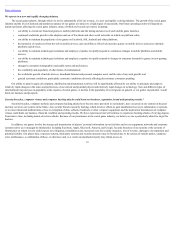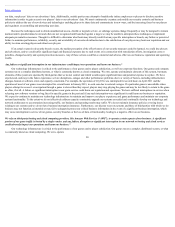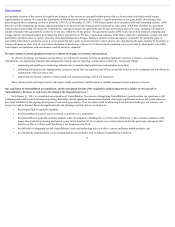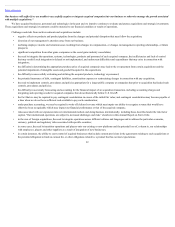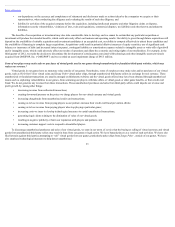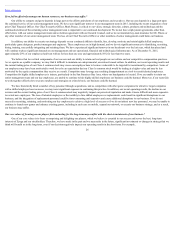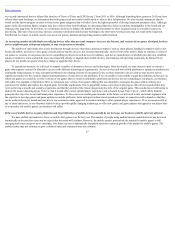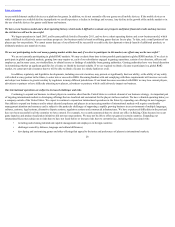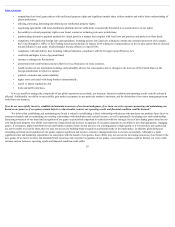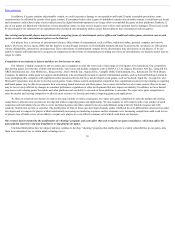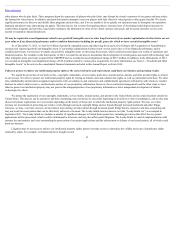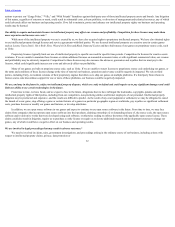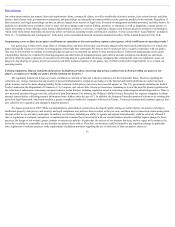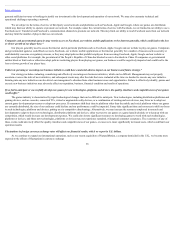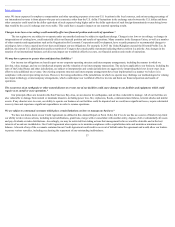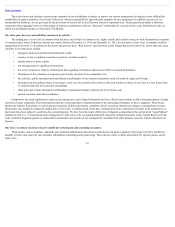Zynga 2015 Annual Report Download - page 32
Download and view the complete annual report
Please find page 32 of the 2015 Zynga annual report below. You can navigate through the pages in the report by either clicking on the pages listed below, or by using the keyword search tool below to find specific information within the annual report.
Table of Contents
• competition from local game makers with intellectual property rights and significant market share in those markets and with a better understanding of
player preferences;
• utilizing, protecting, defending and enforcing our intellectual property rights;
• negotiating agreements with local distribution platforms that are sufficiently economically beneficial to us and protective of our rights;
• the inability to extend proprietary rights in our brand, content or technology into new jurisdictions;
• implementing alternative payment methods for virtual goods in a manner that complies with local laws and practices and protects us from fraud;
• compliance with applicable foreign laws and regulations, including privacy laws and laws relating to content and consumer protection (for example,
the United Kingdom’s Office of Fair Trading issued new principles in January 2014 relating to in-app purchases in free-to-play games that are directed
toward children 16 and under, which principles became effective in April 2014);
• compliance with anti-bribery laws including without limitation, compliance with the Foreign Corrupt Practices Act;
• credit risk and higher levels of payment fraud;
• currency exchange rate fluctuations;
• protectionist laws and business practices that favor local businesses in some countries;
• double taxation of our international earnings and potentially adverse tax consequences due to changes in the tax laws of the United States or the
foreign jurisdictions in which we operate;
• political, economic and social instability;
• higher costs associated with doing business internationally;
• export or import regulations; and
• trade and tariff restrictions.
If we are unable to manage the complexity of our global operations successfully, our business, financial condition and operating results could be adversely
affected. Additionally, our ability to successfully gain market acceptance in any particular market is uncertain, and the distraction of our senior management team
could harm our business.
Ifwedonotsuccessfullyinvestin,establishandmaintainawarenessofourbrandandgames,ifweincurexcessiveexpensespromotingandmaintainingour
brandorourgamesorifourgamescontaindefectsorobjectionablecontent,ouroperatingresultsandfinancialconditioncouldbeharmed.*
We believe that establishing and maintaining our brand is critical to establishing a direct relationship with players who purchase our products from direct-to-
consumer channels and to maintaining our existing relationships with distributors and content licensors, as well as potentially developing new such relationships.
Increasing awareness of our brand and recognition of our games is particularly important in connection with our strategic focus of developing games based on our
own intellectual property. Our ability to promote the Zynga brand and increase recognition of our games depends on our ability to develop high-quality, engaging
games. If consumers, digital storefront owners and branded content owners do not perceive our existing games as high-quality or if we introduce new games that
are not favorably received by them, then we may not succeed in building brand recognition and brand loyalty in the marketplace. In addition, globalizing and
extending our brand and recognition of our games requires significant and involves extensive management time to execute successfully. Although we make
significant sales and marketing expenditures in connection with the launch of our games, these efforts may not succeed in increasing awareness of our brand or the
new games. If we fail to increase and maintain brand awareness and consumer recognition of our games, our potential revenues could be limited, our costs could
increase and our business, operating results and financial condition could suffer.
29


